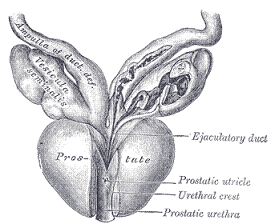The prostate gland, which is normally about the size and shape of a walnut, surrounds the urethra between the pubic bone and the rectum, below the bladder. The prostate gland secretes a fluid that is discharged with sperm. As the prostate grows larger, it may press on the urethra. This narrowing of the urethra can cause some men with prostate enlargement to have trouble with urination. Prostate enlargement or Benign prostatic hypertrophy (BPH) may be the most common health problem in men older than 60 years.
 Causes of Enlarged Prostate:
Causes of Enlarged Prostate:Enlargement of prostate is caused by vitiated vayu and apaana vayu.
This vitiation is caused by
Controlling the urge of urination
Controlling the urge of defecation
Over indulgence in sex.
Consuming dry, very cold and less quantity of food
Old age
General weakness
Indigestion
Difficulty starting urination
Dribbling of urine, especially after urinating
A sense of not emptying the bladder
Leaking of urine
More frequent urination and a strong and sudden desire to urinate, especially at night
Difficulty to control the urination urge.
Feeling a burning sensation when passing urine.
Passing urine mixed with blood (symptom of infection)
Ayurvedic tips for Self-Care:
* Avoid drinking more liquids after 6 pm to reduce the need to urinate frequently during the night.
* Drink 8 glasses of water a day to help prevent bacteria from accumulating in the bladder.
* Drink cranberry juice 4 times a day to increase the acidity of the urine, especially if you feel a urinary tract infection coming on.
* Alcohol, tobacco, coffee increase vata and vitiate it. Hence avoid alcohol, tobacco and coffee, especially after dinner.
* Avoid foods which cause constipation as constipation causes vitiation of vata.
Diet :
Prostate enlargement is caused by an imbalance in Vata dosha, it’s important to avoid Vata-aggravating foods. These include dry, cold, and light foods and bitter, astringent, and pungent tastes. Instead, favor the Vata-pacifying diet, which includes sweet, sour, and salty tastes and warm, oily foods.
Foods like wheat, rice, milk, tomatoes, yogurt, citrus fruits are recommended, while care should be taken to minimize spicy, bitter foods and astringents like beans and apples. For pacifying vata, larger portions of food can be eaten, but not more than what can be digested easily. All dairy products are believed to balance vata dosha, but take care to consume warm milk and avoid milk after a full meal. Also spices like ginger, cumin, cardamom, cloves, cinnamon, mustard seeds, black pepper apart from non-vegetarian food (except beef) and nuts are found to be good. However, all vegetables belonging to beans category except mung dhal and tofu should be avoided.
Include lots of fiber in diet ( fruits and vegetables which are rich in fiber).
Life Style:
The patient should not expose himself to sun or heat. Excessive perspiration takes away lot of water from the body and the urine thus becomes concentrated. Passage of this concentrated urine through the urinary tract causes irritation and gives rise to burning sensation.
Useful Herbs:
Shilajeet (Asphaltum): Purified exsudate of mineral origin, Shilajeet is a balanced general tonic comprising useful mineral and organic constituents. It is taken to help digestion and with the assimilation of foods. Shilajeet is often used in combination with other specific plant decoctions to support various functions. Traditionally it has been used in genitourinary infections, diabetes, enlarge prostate, bronchial asthma, stomach problems, stress anxiety and convalescence indication.
Ushira (Vetiveria zizanioides): Ushira is popularly known as Khas, Khas or Khus grass in India. It is a densely tufted grass, found throughout the plains and lower hills of India, particularly on the riverbanks. Different parts of this grass is used for many diseases such as mouth ulcer, fever, boil, epilepsy, burn, headache, enlarge prostate etc.
Gokshura--Small Caltrop (Tribulus terrestris) Tribulus terrestris has traditionally been used to reduce inflammation and improve urination – the latter includes an ability to ease painful, burning sensations when urinating.
Khadir: Areca catechu has traditionally been used as an aphrodisiac and to reduce an enlarged prostate.
Shatavari: Asparagus racemosus helps relieve inflammation and improves urination – including urine retention.
Punarnava - Hog Weed (Boerhaavia diffusa) It is prescribed in case of all urinary problems that are caused due to prostate ailments.
Gorakhmundi:Globe thistle( Sphaeranthus hirtus) is very useful in enlargment of prostate .
Salam Mishri: Salep Orchid (Orchis mascula) The salep orchid is known as salam mishri in Ayurveda. It is prescribed in case of prostate problems brought on by vata vitiation.
Lata Karanj: Caesalpinia bonducella has also been found to exert a soothing, anti-inflammatory action, which makes it particularly beneficial for improving an enlarged prostate.
No comments:
Post a Comment